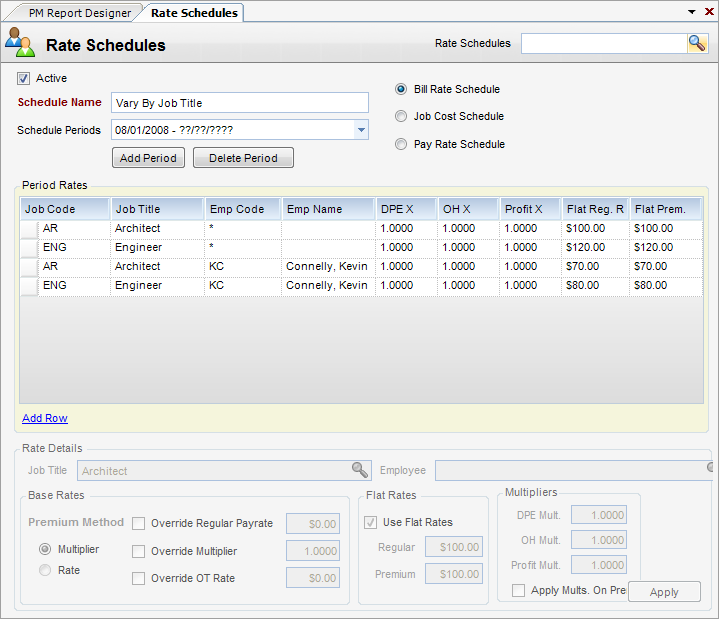Overview
Rate schedules are used to control job cost and bill rate schedules in the application. Once rate schedules are set up, they can then be applied to projects. Rate schedules are date-sensitive to all period changes to schedules.
Note: When time sheets are entered or edited in the system, they automatically pick up rates and store them in the time sheet module, where they are available for reporting. The Recalculate Rates utility is used to retroactively apply rates to time entries.
Grid descriptions are listed below

Schedule Name - Name of the Rate Schedule. Must be unique.
Schedule Periods - Date range where the selected Rate Schedule is active.
Add Period - When you click on this, you can create a new Rate Schedule date range.
Delete Period - When you click this button, the selected Rate Period will be deleted.
Bill Rate Schedule - When selected, the current Rate Schedule is a Bill Rate Schedule.
Job Cost Schedule - When selected, the current Rate Schedule is a Job Cost Schedule.
Pay Rate Schedule - When selected, the current Rate Schedule is a Pay Rate Schedule, however, Pay Rates cannot be multiplier based.
Add Row - When you click on this, the bottom section of this Applet (Rate Details, see below) becomes active so that you can add a new row to the current Rate Schedule.
RATE DETAILS
| • | Job Title - Job Title to be matched; left blank, any job title is a match. |
| • | Employee - Employee to match; left blank, any employee is a match. |
Base Rates
| • | Premium Method Multiplier - When checked, the Employee OT Multiplier is used; if Override Multiplier is checked, the multiplier here is used. |
| • | Premium Method Rate - When marked, either the Employee OT rate is used or if override rate is checked then the rate entered here is used. |
| • | Override Regular Rate - When checked, the entered amount will be the regular base rate. Otherwise the employee regular pay rate is used |
| • | Override Multiplier - Overtime multiplier if premium method is selected and override multiplier is checked. |
| • | Override OT Rate - Overtime multiplier if premium method is selected and override multiplier is checked. |
Flat Rates
| • | Use Flats Rates - When checked, flat rates will be used for the job cost or bill rate. Otherwise multipliers will be used. |
| • | Regular - Rate for non-premium time. |
| • | Premium - Rate for premium time. |
Multipliers
| • | DPE Mult.- Direct personal expense multiplier |
| • | OH Mult.- Overhead multiplier |
| • | Profit Mult.- Profit Multiplier |
Apply Mults. On Premium - When checked, the premium portion of overtime is marked up. For Example:
An Employee gets paid $10/hr straight time and $15/hr OT. The billing multiplier is 3.0.
When apply MU on Premium is true formula on overtime item is $15*3=$45
When apply MU on Premium is false formula on overtime item is ($10*3)+$5=$35